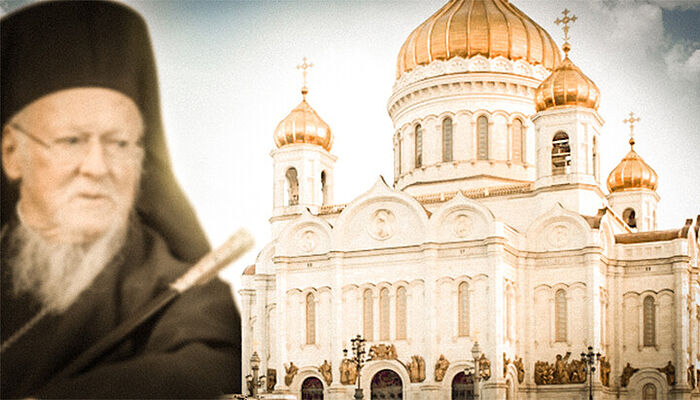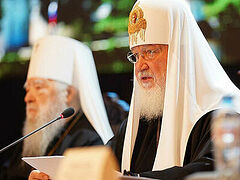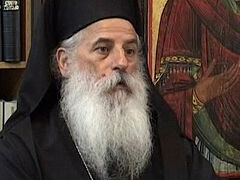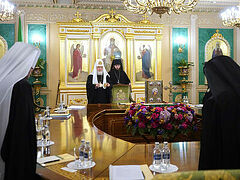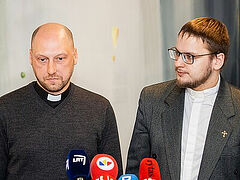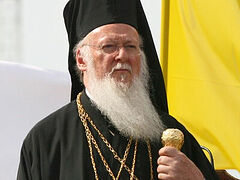Sergiev Posad, Moscow Province, Russia, July 21, 2023
On Wednesday, July 19, a host of hierarchs of the Russian Orthodox Church gathered at the Holy Trinity-St. Sergius Lavra for a Bishops’ Conference.
The hierarchs discussed a number of current issues of Church life, including the schism and war in Ukraine and the heretical ecclesiology of the Patriarchate of Constantinople. In the end, a ten-point resolution was adopted and published (read the full English translation here).
During the Conference, Metropolitan Hilarion of Budapest and Hungary, Chairman of the Synodal Biblical-Theological Commission, presented the Commission’s report “On the Distortion of the Orthodox Teaching About the Church in the Acts of the Hierarchy of the Patriarchate of Constantinople and the Speeches of its Representatives.”
The document received the hierarchs’ general approval and will be submitted to the Holy Synod for formal adoption.
Met. Hilarion began his presentation bluntly:
In 2018, the Patriarchate of Constantinople invaded Ukraine. It was followed by the legalization of the Ukrainian schism. This not only inflicted the heaviest wounds on Ukrainian Orthodoxy, but also split the entire Orthodox world.
Behind these acts stand the innovative ecclesiology of the Patriarchate of Constantinople, “aimed at destroying the existing canonical foundations,” Met. Hilarion said. The Commission’s document thus aims to remind the Orthodox flock of true Orthodox ecclesiology.
The document consists of an introduction, eight main sections, and a conclusion.
The introduction identifies the problem of the active dissemination of Constantinople’s new ecclesiology whereby it enjoys much broader rights and powers than the primates of other Local Churches.
The first section argues that Orthodoxy knows only a primacy of honor, not power, which even Constantinople used to maintain in response to the excessive claims of the Papacy. The document quotes epistles from several Patriarchs of Constantinople from the 12th to 19th centuries emphasizing that all Orthodox Patriarchs are equal among themselves.
However, today, Patriarch Bartholomew and other representatives of Constantinople argue for a primacy of power, that Constantinople is the “first without equals,” that Constantinople is no longer a Sister Church, but now the Mother Church for all others.
Constantinople theologians, such as Metropolitan John (Zizioulas) of Pergamon, have even compared the Patriarch of Constantinople to God the Father, “and his primacy is likened to the primacy of the Father in the Holy Trinity” (see Bishop Irenei (Steenberg’s) “Christ and the Church: Responding to Contemporary Currents in ‘Trinitarian Ecclesiology’” for an able refutation of this serious error).
Such ideas are “based neither on Holy Scripture nor on the Tradition of the Church. Even Catholics do not have such an idea: the Pope of Rome is not compared with God the Father, he is only called the successor of the Apostle Peter,” Met. Hilarion said in his presentation.
Today, Constantinople theologians even claim that anti-papism is a heresy, the document states. Now, they argue that being Orthodox is defined by being in communion with Constantinople.
The second section is dedicated to the new theory that Constantinople is the highest appellate court for the entire Church, able to simply reinstate defrocked clerics without any serious examination of their relevant cases. “A most dangerous situation of complete canonical lawlessness is being created under the wing of Constantinople,” Met. Hilarion said.
The ROC document analyzes historical cases to demonstrate that Constantinople acted not as the highest appellate court, “but as a coordinator of assistance provided to one Church by other Local Orthodox Churches.”
Thus, Constantinople has no right to simply intrude into the internal affairs of other Local Churches, and therefore, Pat. Bartholomew’s decisions to reinstate Philaret Denisenko, as well as five Lithuanian, two Belarusian, and one Moscow cleric were made in violation of the clerics, Met. Hilarion said in his presentation of the Synodal document.
The third section is devoted to Constantinople’s restoration of the Ukrainian schismatics who were never validly ordained in the first place, or who were ordained by the defrocked, excommunicated, and anathematized Philaret Denisenko. The document quotes statements from several primates, councils, synods, and hierarchs on the matter, including His Holiness Patriarch Porfirije of Serbia, who said: “The Church is the Church, and an illegal parasynagogue can become a Church only through repentance and canonical procedure, but not by anyone’s stroke of a pen.”
The fourth section refers to Constantinople’s claim to the right to receive clerics from any Local Church without a canonical release. In 1996, Constantinople received the Moscow Patriarchate’s bishop of Sourozh without a canonical release, with Met. John (Zizioulas) arguing that all clerics in the diaspora are actually clerics of Constantinople anyways, even if they don’t realize it.
However, now Constantinople has extended this false claim even to the territory of other Local Churches, based on a faulty interpretation of the canons.
The fifth section is dedicated to Constantinople’s claim to the exclusive right to grant autocephaly. The Commission’s document presents many examples to the contrary:
The four Eastern Patriarchates did not receive autocephaly from anyone at all. The Georgian Church received autocephaly from Antioch, and the Cypriot Church received autocephaly by the decision of the III Ecumenical Council. The Russian Church independently acquired autocephalous status at the time when the Patriarch of Constantinople entered into union with Rome, and then, almost a century and a half later, was recognized in Patriarchal status by the acts of four Eastern Patriarchs… The Russian Church granted autocephaly to the Churches that were part of it: Polish (1948), Czechoslovak (1951) and American (1970). And the Serbian one — the Macedonian Church that was part of it (2022). In all the cases mentioned, the basic principle was observed: the Kyriarchal Church granted autocephaly to its part.
It was agreed during the preparations for the pan-Orthodox council that autocephaly would from henceforth be granted by all Local Churches together, but since the final document was not adopted by Crete, Pat. Bartholomew has renounced this agreement and claimed for himself the exclusive right to grant autocephaly.
The sixth section analyzes the “tomos” granted to the schismatic “Orthodox Church of Ukraine,” which grants a formal autocephaly while keeping the OCU in a state of dependence upon Constantinople. “This is how Constantinople now perceives other Local Churches—not as sisters, but as daughters who are directly dependent on their mother, who can interfere in their internal affairs at her discretion,” Met. Hilarion said.
Moreover, Constantinople also claims the right to unilaterally abolish any autocephaly, as Pat. Bartholomew threatened to the Orthodox Church of the Czech Lands and Slovakia in 2012.
The seventh section is devoted to Constantinople’s supposed right to cancel conciliar or synodal decisions at whim, such as was the case in 2018 when Constantinople suddenly canceled the 1686 act that transferred the Kiev Metropolia to the Moscow Patriarchate. Such claims “do not correspond to the canonical structure of the Church and plunge inter-church relations into a state of chaotic lawlessness,” reads the document from the Synodal Commission.
Finally, the eighth section is devoted to Constantinople’s claim of jurisdiction over the entire Orthodox diaspora—a claim that began in the 1920s with Patriarch Meletios (Metaxakis), again based on a faulty interpretation of the canons.
“The current claims of the Patriarchate of Constantinople cover even countries where there are no structures of this Patriarchate and where missionaries from the Church of Constantinople have never preached, for example, Japan and China,” Met. Hilarion noted.
Met. Hilarion concluded:
In conclusion, the Russian Orthodox Church once again expresses its disagreement with both the theoretical provisions of the new ecclesiological concept of the Patriarchate of Constantinople and the practical actions taken to introduce it into modern Church life. The new ecclesiology of Constantinople is assessed as destroying the canonical foundations of the Universal Church and causing grave harm to the unity of the Local Orthodox Churches.
The adoption of this document seems very timely. The root of the division in world Orthodoxy, in addition to political reasons, was the distortion of Orthodox ecclesiology. This obliges us to bear witness to the intact Orthodox doctrine, revealing it in relation to the deviations from the canonical order that have arisen.
The document is intended to express strong disagreement with the actions of the Patriarchate of Constantinople, which actively and aggressively inculcates its ideas and implements them in anti-canonical acts. The absence of a theological and canonical reaction to such actions of the Patriarchate of Constantinople would give ground for the further expansion of its exorbitant claims.
Follow OrthoChristian on Twitter, Vkontakte, Telegram, WhatsApp, MeWe, and Gab!

